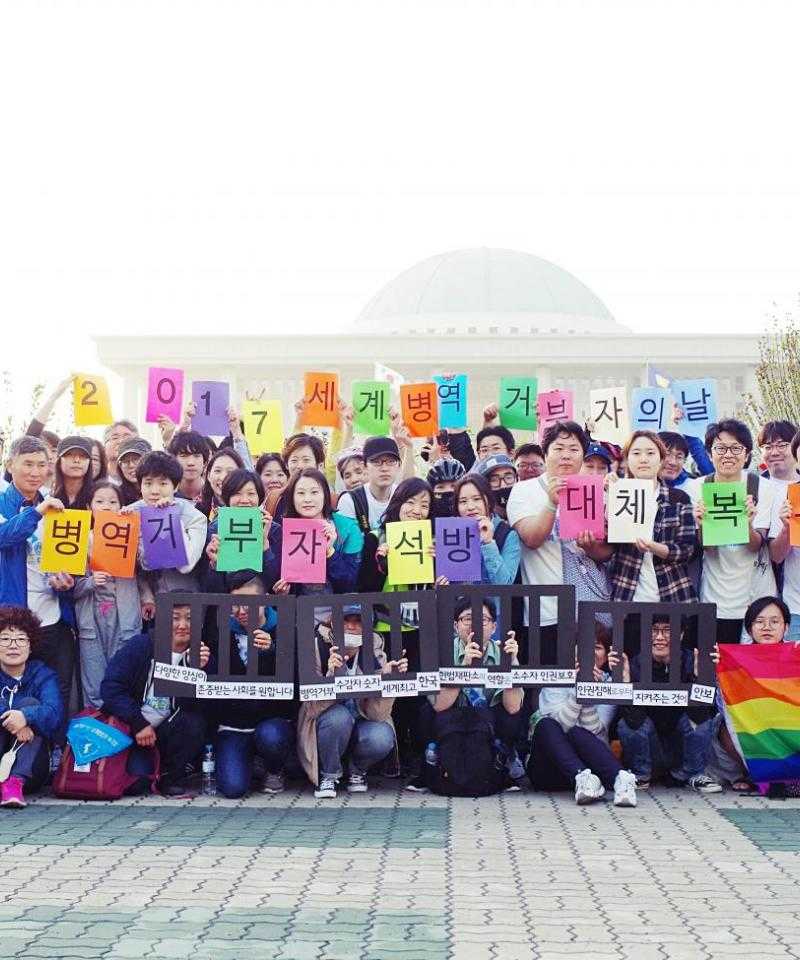South Korea: Growing hopes for conscientious objectors

Recent updates from South Korea increase hopes for the recognition of the right to conscientious objection in the country. Since our last update, three more conscientious objectors, who had been indicted for their refusal to serve in the military, have been found not guilty by their district court. Meanwhile, the Government and the President Moon Jae-in, who promised to introduce an alternative civilian service during his election campaign, has continued to face pressure from human rights groups for the recognition of the right.
In response to ongoing demands from human rights groups, government officials have said they are working on a revision of the military service law, although it's too early to say exactly when and how this will happen.
Three conscientious objectors found not guilty
On June 8th, three men who had been indicted for their conscientious objection to military service were found not guilty by the Gimcheon branch of the Daegu District Court. Together with this final decision, there are now 13 conscientious objectors in total found not guilty by the South Korean courts only this year. This is almost half of the total number of cases as such, which is 30, since 2004 where conscientious objectors have been cleared of their charges. According to some, this recent increase in the number of not guilty verdicts appears to be a message by the judges at district courts to the Constitutional Court, which has been delaying its decision on conscientious objection, and to the government, who have been hesitant in introducing an alternative military service system.
Increasing pressure on the Government
Meanwhile, the Government has also been pressurised by human rights groups to make legislation enabling an alternative civilian service to military conscription as soon as possible.
On 15th May, International Conscientious Objection Day, a group of conscientious objectors and Amnesty International activists organised a protest in Seoul, calling on the Government to make necessary changes to the law as soon as possible. During their action, the conscientious objectors read their testimonies, made a statement calling for the policy change and staged a performance where they were tied up and marched into the mock prison.
In June, the National Human Rights Commission of South Korea made a statement saying that they will advise the defence minister to establish policy measures on an alternative to military service. Citing both the increasing consensus among South Koreans on the issue and the previous recommendations made by the UN Human Rights Committee, the agency said it's necessary to swiftly resolve the situation and make steps to avoid rights violations of conscientious objectors.
In its statement, the commission noted results of a public survey it conducted. According to the survey, South Koreans in support of an alternative system rose from ten percent in 2005 to 46 percent in 2016.
Besides, the UN Human Rights Committee had said several times that South Korea's failure to recognise conscientious objection to military service was a violation of freedom of thought, conscience and religion.
The National Human Rights Commission also emphasised that any commission evaluating the applications by conscientious objectors should be independent and fair, and should not belong to the Defense Ministry or the Military Manpower Administration.
State loses suit for disclosing names of conscientious objectors
Alongside this ongoing pressure, a group of conscientious objectors won another suit against the Korean State, which was against the Military Manpower Administration (MMA) this time.
On 3rd May, a Seoul court ruled against the MMA for disclosing names and other personal information of conscientious objectors under the category of draft dodgers. The Court granted an emergency injunction filed by 116 conscientious objectors whose names had been on the administration body's website since December 2016.
In its decision the court said "Publicly disclosing their personal information results in irrevocable and imminent harm on the part of the plaintiffs, and granting their motion is necessary to prevent any further harm."
As reported by the Korean Times, this emergency decision hasn't been a permanent one, but valid only until the ruling is made after an official trial begins between two parties.
The defence attorney representing the group said he welcomes the decision that helped protect their human rights.
Source: The Hankyoreh, Three more conscientious objectors found not guilty, 12 June 2017; The Korean Times, Ray of hope for conscientious objectors, 15 May 2017; The Korean Times, State loses suit for disclosing names of conscientious objectors, 3 May 2017.
Add new comment